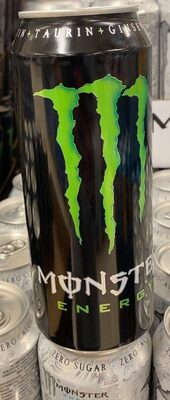
Barcode: 5060166694777
Monster energy
HALAL
📝 Reason: Most ingredients in Monster Energy are Halal if synthetically or plant-derived. However, ingredients like ‘natural flavoring substances’, L-carnitine L-tartrate and vitamin B12 are considered Doubtful due to potential use of animal derivatives unless otherwise certified or specified as synthetic/vegetarian sources. In the absence of explicit Halal certification, all ingredient sources must be clearly known for Halal certainty. Refer to IFANCA and Quran 5:3 for guidelines.
🏷️ Category: Beverages, Carbonated Drinks, Artificially Sweetened Beverages, Energy Drinks, Energy Drink With Sugar, Sweetened Beverages
📄 Certificates: Not Advised For Specific People, Not Advised For Children And Pregnant Women, Not Advised For Pregnant Women, Not Recommended For Children Under 3 Years, Vegetarisch, Vegan
Ingredients:
Details
Understanding Monster Energy’s Halal Status
When it comes to choosing beverages, especially energy drinks like Monster Energy, many consumers are concerned about the Halal status of the ingredients. This is particularly true for the Muslim community, where it is essential to ensure that products consumed comply with Halal guidelines. Monster Energy is labeled as HALAL, but what does that mean for its ingredients and overall consumption? Let’s dive deeper into the details.
The Ingredients Breakdown
Monster Energy consists of several ingredients, most of which have been deemed Halal based on their sources and manufacturing processes. Let’s examine these in detail:
- Carbonated water: This is simply water carbonated with CO2, recognized universally as Halal.
- Sucrose: A common table sugar derived from plants, Halal unless processed with animal derivatives. No such processing is indicated for Monster Energy.
- Glucose syrup: Typically derived from corn, wheat, or potatoes, it’s Halal unless animal-derived enzymes are involved, which is not specified here.
- Citric acid: Generally produced through fermentation of plant carbohydrates and considered Halal.
- Natural flavoring substances: These can be plant or animal-based, and since the source isn’t specified, their status is regarded as Doubtful.
- Taurine: Most taurine in beverages is synthetic and considered Halal unless from an animal source. In Monster Energy, it remains unconfirmed, thus safe.
- Sodium citrate: A salt derived from citric acid, typically plant or fungal; hence, it is Halal.
- Panax ginseng root extract: This herbal extract is derived from the ginseng plant and classified as Halal.
- L-carnitine L-tartrate: Its origin can be animal or synthetic; since unspecified, it remains Doubtful without clear certification.
- Caffeine: Primarily from coffee or tea, this stimulant is Halal.
- Preservatives: Sorbic acid and benzoic acid are synthetic and therefore Halal.
- Coloring agent (anthocyanins): Derived from plants, these pigments are Halal.
- Vitamins (B2, B3, B6, B12): While Halal, B12’s production sometimes involves animal derivatives, rendering its status uncertain without specific source clarity.
- Sodium chloride: Common table salt is Halal.
- D-glucuronic acid lactone: This ingredient can originate from either plant fermentation or synthetic processes, thus being Halal.
- Guarana seed extract: A Halal caffeine source derived from the guarana plant.
- Inositol: Generally plant-derived and classified as Halal.
- Sweeteners (sucralose): An artificial sweetener that is chemically synthesized and Halal.
- Maltodextrin: Usually derived from plant sources but could risk cross-contamination; still, no specific contamination during production was indicated.
Why the Doubtful Ingredients Matter
Some ingredients, like natural flavoring substances and L-carnitine L-tartrate, have ambiguous sources which can lead to uncertainty regarding the drink’s Halal compliance. Consumers are encouraged to look for explicit Halal certifications or seek recommendations from reliable certifications such as IFANCA (Islamic Food and Nutrition Council of America). According to Quran 5:3, consuming what is pure and Halal is essential.
Community Guidelines and Recommendations
While Monster Energy is generally noted as Halal, it isn’t advised for children, pregnant women, or individuals with specific dietary restrictions. It’s vital to check the labels and opt for products that bear recognized Halal certifications whenever possible. Such vigilance ensures your choices align with Halal dietary laws.
Conclusion
In summary, Monster Energy’s Halal status is a mix of assurance and uncertainty based on its ingredients. While many components are Halal, some remain doubtful due to unspecified sources. Always verify with the manufacturer or refer to credible Halal certification resources before consumption. Making informed decisions reflects good practices in aligning food choices with faith.
